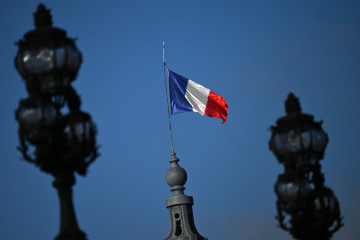

On the eve of the proposal of a pension-reform plan that was met with tense social uprisings, it didn’t take much for the familiar racial and religious violence to join in the throng of discontent in an unstable French social reality.
In the last few weeks alone, three disturbing events shook the daily lives of Muslims and minorities living in France.
Moments after the France-Morocco World Cup semi-final, far-right groups took to the streets in multiple cities to intimidate Muslims. As a result, one Muslim boy was killed after he was hit by a car driven by white France supporters.
On December 23, a white man murdered three Kurdish people in the heart of Paris. Just three days later, another white man – who allegedly declared to the police how the previous attack gave him “strength" – shot a 13-year-old Muslim girl who fortunately survived the attack.
"As a result of this concerted effort [in France] to conceal the direct link between racist discourse and real-world violence, the risk to Muslim populations increases"
How exactly did Islamophobic and racist violence emerge in the heart of Europe, a continent depicted by some as a “garden” whose values intimidate authoritarian regimes? To properly understand these incidents we must first explore the mechanics of the structural disorder they are a symptom of.
A supremacist cultural landscape
Though Islamophobia and state xenophobia appear clear, we must also consider the cultural roots behind these attitudes, issues which are all too often relativised and misunderstood in the international sphere.
In November 2022, novelist Michel Houellebecq and philosopher Michel Onfray published the contents of a discussion they had, rife with Islamophobic and crude racist remarks.
Both thinkers explicitly validated their belief in the “great replacement theory”, Houellebecq anticipated “acts of resistance” – made of “attacks” and “mass shootings” in mosques – once entire “neighbourhoods” will be submitted to “Muslim domination”.
Algerian Muslim freedom fighters during the War of Independence were categorised as “terrorists” and the conclusion reached was: “Our only chance of survival is for white supremacy to become trendy in the US.”
The influence of these perspectives on the French political landscape is undeniable. Houellebecq, who repeatedly depicted Islam and Muslims as a mortal civilizational threat to the West in the last two decades has since acquired a “prophetic reputation” in his home country.
Novels like Platform, which tells the story of a man losing his love interest in a Muslim-led attack was published a few days prior to 9/11 and has been regarded since as a brilliant literary and political premonition.
Submission, which narrates the political takeover of France by a Muslim party, was published the very day Charlie Hebdo was targeted by Al-Qaeda.
Key political figures – from the current Minister of the Economy Le Maire to former President Nicolas Sarkozy – support, share and co-opt the perspectives of these widely-regarded men.
The recordings of a fleeting conversation betray something much deeper at play. They serve as a symbol of an insecure yet deeply influential Islamophobic culture which regards Muslims’ freedom as a threat, and supremacist violence as a necessary path to survival.
Concealing shameful motives to protect France’s global reputation
The tacit endorsement of violence can only materialise with the complicity of the media and, of course, the State. Both dealt with events in a similar fashion. They systematically tone down their gravity and obfuscate their motives.
The concrete end result of this is the Islamophobic and supremacist narratives cultural figures crafted over time – narratives embraced, to varying degrees, by media and the French State.
The death of a boy due to the far-right raids that followed the World Cup game was treated as a mere anecdote, an anomaly to be brushed over despite France having the highest threat of far-right violence in European nations.
|
The anti-Kurdish attacker was sent to a psychiatric asylum and some mainstream media even tried to suggest that the attack was ‘Turkish led’, despite the explicit confession of the assassin.
Judicial authorities refused to acknowledge the Islamophobic and racist motives which led to the Muslim girl’s attack, once again despite clear and undeniable evidence. Media coverage was minimal, with national outlets publishing short articles days after the life-threatening aggression took place.
At no point, it must be noted, did the media use the term “terrorist” or “terrorism” to describe the attackers – the terms of reference are only reserved for Muslim perpetrators of similar actions.
The State and media systematically took into account the psychological aspects of the case, to explain and provide context for the assumed intentions of the perpetrators.
As a result of this concerted effort to conceal the direct link between racist discourse and real-world violence, the risk to Muslim populations increases.
It is time to clearly reaffirm the reasons racial and religious violence enjoy currency in France. Far from being isolated events with marginal significance, they must be viewed as part of a wider complex web whose threads trap the entire nation.
By sharing this more honest understanding on the international stage, we stand a chance and can protect Muslims and other minorities living in France.
France diligently exerts effort to conceal its Islamophobia and racist discourse in a bid to preserve its international reputation as a nation that defends and promotes human rights – a reputation now entirely undeserved at real risk of a downgrade.
Rayan Freschi is a French jurist and researcher at the London-based advocacy organisation CAGE
![A Muslim man holds a banner reading "French And Muslim, Proud Of Both Identities" at a march against Islamophobia in Paris [Getty Images]](/sites/default/files/styles/medium_16_9/public/2023-02/GettyImages-1181354180.jpg?h=199d8c1f&itok=kJq2MECF)



 Follow the Middle East's top stories in English at The New Arab on Google News
Follow the Middle East's top stories in English at The New Arab on Google News


